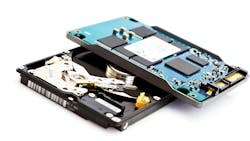Why Purpose-Built Drives are a Must for Industrial Devices
What you’ll learn:
- Why purpose-built drives offer superior reliability and performance for industrial devices.
- What risks and compatibility issues are associated with using commodity drives?
- How a controlled BOM enhances the reliability of purpose-built drives.
- Why tailored storage solutions are essential for specific industrial needs and environments.
As electronic devices continue to play a significant role in our everyday lives, from digital signage to ordering kiosks and smart parking meters, the importance of specialized storage solutions for these devices can’t be overstated.
Unlike their commodity counterparts (meaning storage drives for laptops or desktop computers), purpose-built drives offer specialized features that provide critical reliability and performance, essential for the smooth operation of industrial applications. The difference between these two types of drives is clear—purpose-built drives provide reliability and peace of mind for industrial devices while relying on commodity drives can lead to significant operational and financial risks.
Unmatched Reliability and Performance for Industrial Devices
Industrial devices run the gamut of possible use cases, from advanced manufacturing equipment or satellites to drones, ATMs, and medical devices. Each of these applications demands storage solutions that can withstand specific conditions, accounting for details like device security, temperature, or frequency of use.
Traditional consumer storage drives fall short of these requirements and can fail or become deprecated over time. Purpose-built drives, though, are engineered specifically for a device’s anticipated conditions, ensuring that devices operate reliably without fail.
The Risks of Commodity Drives: Compatibility Issues and Operational Disruptions
If industrial devices are built with commodity drives to save money, this can eventually cause a host of expensive problems, chief among them being compatibility issues and operational disruptions.
Off-the-shelf hardware can be integrated into an industrial device’s design, but intensive planning and careful adjustment are required to ensure the physical form and digital format of the drives are compatible with the entire system. The more commodity-grade components that make up an industrial device, the more compromises and changes will be required to coordinate the disparate elements over the device's lifecycle efficiently.
By working with experts to identify device-specific needs, manufacturers can future-proof their design by selecting the exact drive to fit the entire system rather than the other way around.
Aside from the comparative ease of development, purpose-built drives also provide improved reliability. Commodity drives designed for consumer usage often come with various necessary configurations and components (a setup referred to as multiple bill of materials or BOMs), which can lead to unpredictable performance and compatibility challenges when dependencies change in the future.
For complex industrial systems, discrepancies like these only surface once thousands of units are deployed across various locations. This leads to costly recalls, firmware updates, or even complete drive replacements to resume standard and safe functionality. The clean-up operation for a scenario like this is not only financially burdensome, but it can also damage the reputation of the device manufacturers.
What Sets Purpose-Built Drives Apart
Purpose-built drives distinguish themselves through a carefully controlled BOM, which is foundational to their reliability and consistency. This controlled BOM ensures that every drive configuration remains unchanged throughout a product's lifecycle, drastically reducing the risks associated with component changes.
When a specific device model has tens of thousands of units deployed worldwide, manufacturers need certainty that a change in hardware or firmware won’t require every unit to be serviced individually. On the physical side, these specialized drives can be built with specially screened components to operate reliably across a broad range of environmental conditions.
Temperature protection is often the most important, whether for a road sign running all day in the summer heat in Phoenix, Arizona, or in the low temperatures of rural Canada during the winter. By ensuring operational continuity and reducing the likelihood of device failures, these drives contribute significantly to a manufacturer’s trustworthiness for industrial-scale device deployments of all kinds.
In addition to operational advantages, purpose-built drives are designed with enhanced security features to protect sensitive data against cyberthreats, an increasingly critical concern in today's interconnected world. This focus on security minimizes the risk of data breaches, ensuring that industrial applications remain protected against external threats.
Working directly with manufacturers of purpose-built drives offers another layer of value—access to expert knowledge and custom solutions tailored to specific industrial needs. This collaboration allows for the development of storage solutions that are not only reliable and high performing, but also perfectly aligned with the unique requirements of each application use case. This kind of close partnership is instrumental in ensuring that every component is designed for the best long-term performance of the device.
Investing in Peace of Mind
While it can be tempting to pursue the most inexpensive option for device components, using commodity drives in industrial devices carries significant financial and logistical risks.
When working directly with a drive manufacturer experienced in industrial use cases, buyers can be confident of the drives’ reliability, performance, and ability to support ongoing critical operations for their devices. By investing in specialized storage solutions and working closely with knowledgeable experts, buyers are able to save time and money, instilled with the confidence that the drive components were built with their specific device use in mind.
About the Author

Ariel Perez
Technology Business Manager, SSD Products, Kingston Technology
Ariel Perez is Technology Business Manager of SSD Products at Kingston Technology.
